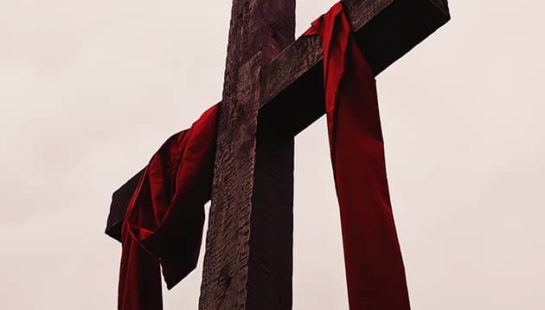It was a risky move from the start, asking Pilate for the corpse. So, when Joseph of Arimathea approached the local politician about burying the body of a man who’d claimed to be the Son of God, he knew it was dark and dangerous—on lots of levels.
But as a sinner redeemed by grace, I’ve always believed that God does his best work in the dark and on that Good Friday, as Jesus hung dead on a cross, it was Joseph who saw a need in the darkness and was compelled to respond.
Who Was Joseph Of Arimathea?
Who was Joseph of Arimathea? All four Gospel writers refer to him as ‘of Arimathea’, meaning he was from the Judean town of Arimathea. And when we piece together each account of that Good Friday, we get a clear picture of a successful man, a man like any prominent businessman or community leader we’d respect.
Matthew calls him a rich man (Matthew 27:57) and a disciple of Jesus who places Jesus in his own tomb. Mark describes Joseph as a prominent member of the Council (of Jewish leaders) who ‘himself was waiting for the Kingdom of God’ (Mark 15:43) when he went ‘boldly’ to Pilate to ask for Christ’s body. Luke also calls Joseph a member of the Council, ‘a good and upright man who had not consented to their decision and action’ and who was ‘waiting for the Kingdom of God’ (Luke 23:50,51). And John says Joseph was ‘a disciple of Jesus but secretly because he feared the Jewish leaders’ (John 19:38).
John also tells us that Nicodemus (of John 3 fame) accompanied Joseph with a mixture of embalming spices and aloes, about 35 kilograms, an amount consistent with the burial of a king.
Why A Prominent Man Identified With A Dead Rabbi
Both men used their own wealth and prominence for burial linens and spices as they wrapped Jesus’ body, and Joseph even used his own ‘grave’ to give Jesus a rich man’s burial in accordance with Jewish customs. John describes the tomb as unused and in a nearby garden while the other three accounts detail that a large stone was rolled in front of it, as if to signal Joseph’s duty was done.
What Joseph thought was a final act of devotion and respect required he use his status and resources to place an innocent and executed man to rest.
Why? Why would a prominent, wealthy, good and upright secret follower of Jesus identify so publicly with a dead rabbi? And why would all four Gospel writers include his story?
I think because no matter his place or status in life, Joseph risked it all because he was moved to identify, both personally and humbly, with Jesus’s death. He carried the corpse of a man he’d come to love and honour as king, sponging spices across his flesh, touching his wounds, wrapping his lifeless body in linen.
I also think that the Gospel writers included his story because of the credibility Joseph’s prominence would bring in confirming Jesus had really died. The specific details of their burial preparation and placement in the tomb with a stone in front left no doubt the execution of Jesus had been successful. The young rabbi from Nazareth was no longer alive. His corpse was wrapped and buried. And that made the account three days later of Christ’s resurrection even more astonishing—and dangerous.
Yes, when Joseph asked Pilate if he could bury Jesus’ body, he was risking his wealth, his power and his prominence to do a noble and right deed he didn’t have to, to care for an innocent man unjustly treated. It meant the possibility of giving up that which made him comfortable.
I’m struck by what Joseph’s dangerous decision says to me today. It challenges me to acknowledge the tortuous wounds on Christ’s body, the injustice of murdering an innocent man. Jesus’ ‘crime’ was to love and to reflect a new way of living, to offer all sinful souls redemption, to give wounded hearts the miracle of restoration, and to bring all humans into fullness of life with him.
His life and death stirred in Joseph a new reality. Likewise, it challenges us to acknowledge Christ’s death and to boldly ask those in power to stop injustice, to care for those unfairly treated, and to afford dignity and honour to those on the margins.
Like Jesus, Joseph and Nicodemus gave up their power and prominence, offering their wealth for a right and just deed. Three days later the most marginalised citizens of the time, women—whose testimony wasn’t allowed in a court of law and who were deemed ‘unfit’ for religious instruction—stepped through the darkness and entered an empty tomb.
Their news shocked the world: Jesus, whom two prominent men had verified as dead, was now alive!
Both wealthy and marginalised individuals had a role to play in the Easter story.
They still do. May we, too, be willing to use our resources and power to right the wrongs around us. And may we listen to the voices of those too often deemed voiceless as they bring life-changing news.


